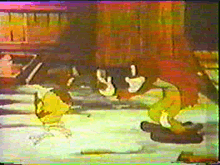Sunday Go to Meetin' Time
| Sunday Go to Meetin' Time | |
|---|---|
| Merrie Melodies series | |
 Nicodemus tries to steal a chicken. Sunday Go to Meetin' Time features African American characters who look and act like blackface minstrel show and coon song stereotypes. | |
| Directed by | Friz Freleng |
| Produced by | Leon Schlesinger |
| Story by | Allen Rose |
| Music by | Norman Spencer |
| Animation by |
Robert McKimson Paul Smith |
| Distributed by |
Warner Bros. Pictures The Vitaphone Corporation |
| Release date(s) | August 8, 1936 (USA) |
| Color process | Technicolor |
| Running time | 7 min (one reel) |
| Language | English |
Sunday Go to Meetin' Time is a Merrie Melodies animated cartoon directed by Friz Freleng, produced by Leon Schlesinger Productions, and released to theatres on August 8, 1936 by Warner Bros. Pictures and The Vitaphone Corporation. The plot follows the misadventures of a black man in the stereotypical minstrel show and coon song mold. He sneaks out of church and soon finds himself in hell, where he learns the error of his ways, and when he wakes up again in the living world, he makes haste to the church. The short's stereotypical portrayal of black characters prompted United Artists to withhold it from distribution in 1968, making it one of the infamous Censored Eleven.
Summary
Ringing bells in a lazy town announce that it is time to go to church. A black preacher with caricatured enormous lips greets his parishioners as he sings the song for which the short is named. A minstrel show dandy and his gal jazz up the song as they dance their way to church. A succession of gags featuring stereotyped black characters follows: a mammy and old uncle shine the heads of pickanniny children; a woman takes a bra off a clothesline to use as a bonnet for her twin children. Lindvall notes that mammies were "ubiquitous in films dealing with black culture".[1]
Freleng introduces the cartoon's protagonist, Nicodemus, when Mammy Two-Shoes finds him playing dice. She exclaims, "You good for nothing! Get yourself to that church. The Devil's gonna get you sure as you're born!" and drags him off by the ear. Nevertheless, Nicodemus slinks out the door, opting to steal some chickens instead. Unfortunately, a knock on the head sends him to the "Hades Court of Justice", where a demon reviews his crimes and sends him deeper into hell. Big-lipped demons carry him to the Devil himself, who sings to Nicodemus that "you've got to give the Devil his due." The boss orders some demons to "give 'em the works," but Nicodemus wakes to find the prods of pitchforks are nothing but the pecks of chickens in the land of the living. He hears the church bells and makes haste to the meeting house.
Distribution
Warner Bros. released Sunday Go to Meetin' Time in American theaters on August 8, 1936. Since 1968, the cartoon has been withheld from distribution. At that time, United Artists owned the rights to color Looney Tunes and Merrie Melodies cartoons before August 1948. Sunday Go to Meetin' Time and ten other cartoons were deemed to feature racist depictions of African Americans, making them too integral to the films for simple cuts to make them palatable for modern audiences. These eleven cartoons make up the so-called Censored Eleven.[2]
Credits
- Produced by Leon Schlesinger
- Directed by Friz Freleng
- Written by Allen Rose
Notes
References
- Bdeir, Ayah (Fall 2004). "That's all Sheikh: Arab representation in U.S. cartoons". CMS. 790. Media Theories and Methods I - Comparative Media Studies - Massachusetts Institute of Technology. Accessed 22 June 2007.
- Lindvall, Terry, and Ben Fraser (1998). "Darker Shades of Animation: African-American Images in Warner Bros. Cartoons". Reading the Rabbit: Explorations in Warner Bros. Animation. Rutgers University Press.
- Straight Dope Science Advisory Board (February 5, 2002). "Did Bugs Bunny appear in a racist cartoon during World War II?" The Straight Dope. Accessed June 21, 2007.
External links
- Sunday Go to Meetin' Time at the Internet Movie Database
- Sunday Go to Meetin' Time at The Big Cartoon DataBase